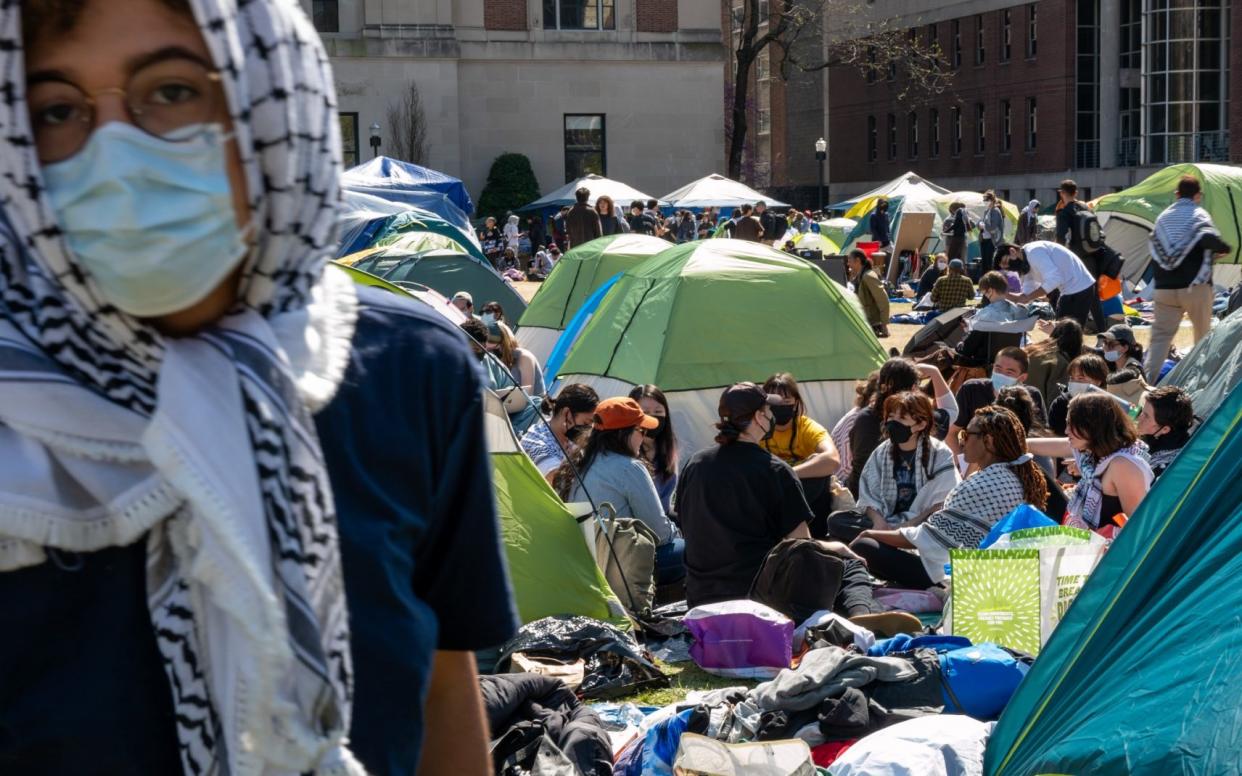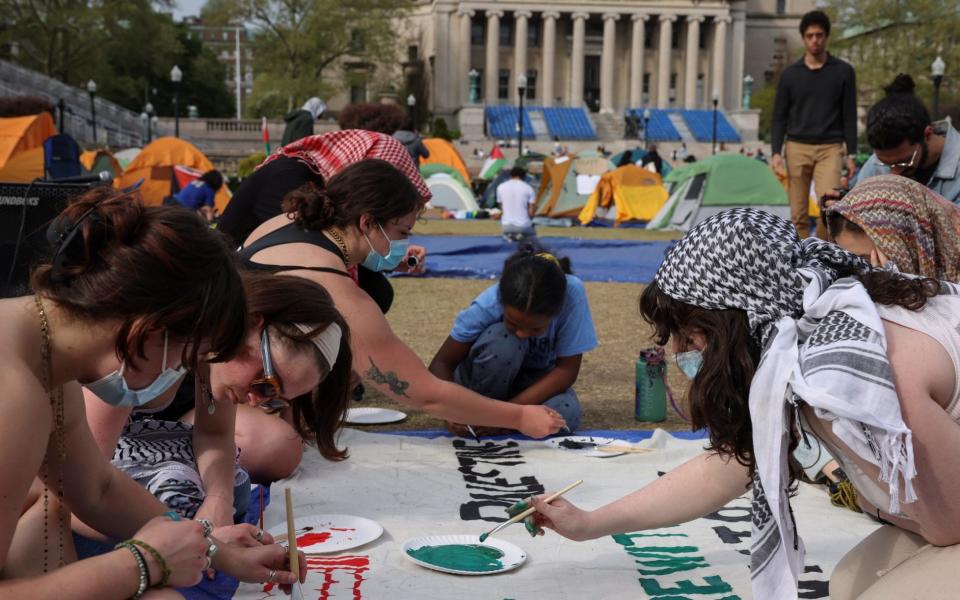Columbia student protesters defy deadline to leave campus

Student protesters at Columbia University defied a deadline on Monday to clear their pro-Palestine encampment after officials warned they would be suspended if they continued their occupation.
The University gave students hours to leave the encampment on Columbia’s West Lawn, where demonstrators have been living in tents for the last two weeks demanding divestment from Israel.
The students were told they would be allowed to leave the protest in “good standing” with Columbia if they vacated by 2pm local time (7pm BST) on Monday and signed a declaration that they would abide by the university’s rules until the end of term.
However, students instead formed a protective circle around the tents while continuing to chant.
“Free, free Palestine,” they shouted. “Disclose, divest, we will not stop, we will not rest.”
“You know what needs to be suspended? Genocide!” Rafael Kadaris, of the Revolutionary Communists group, chanted through a megaphone shortly before the deadline fell.
‘We regret that we need to take these actions’
Columbia had warned students that it had identified “many” of the protesters, and that those who refused to leave would be banned from campus and blocked from graduating.
Three hours after the deadline elapsed, university authorities said they had begun suspending students. They did not clarify how many had been suspended.
“We regret that we need to take these actions, but we must restore order to the campus so that all students can complete their work for the term, study for exams, and feel welcome in the community,” Columbia said in a statement.
The demand came after almost two weeks of negotiation between the university and the protesters, who have called for Columbia to sell any investments linked to Israel, cancel a new “global centre” in Tel Aviv, and grant amnesty to demonstrators who have broken rules.
One student protest group called the threatened suspensions a “repulsive scare tactic”. “We will not move until Columbia meets our demands or we are moved by force,” it said in a statement.

Baroness Shafik, the university’s president, issued a statement on Monday confirming that “the university will not divest from Israel” but that officials had offered to have the proposal explored by a committee.
She said Columbia had also offered to donate money to support humanitarian work in Gaza, and to publish a list of its direct investment holdings – meeting a student demand for financial transparency.
‘Alarming surge of anti-Semitism’
Lady Shafik said the protest encampment had created “an unwelcoming environment for many of our Jewish students and faculty,” and that “external actors” had contributed to a “hostile environment” around the campus, in the Upper West Side of New York.
She said the protest must be cleared in time for a graduation ceremony due to take place on the lawn on May 15.
“We also do not want to deprive thousands of students and their families and friends of a graduation celebration,” she said.

Some of the protesters have been accused of anti-Semitic chants and of harassing Jewish students by chanting about Zionism and calling for an end to the state of Israel.
Joe Biden, the US president, said on April 21 that there had been an “alarming surge of anti-Semitism” after the protests.
An anonymous Jewish student has started legal proceedings against Columbia, CNN reported on Monday, claiming the campus had become “too dangerous”.
Baroness Shafik admitted in a statement the same day that “many” Jewish students had been forced to leave the campus, adding: “That is a tragedy.”
On Monday, a group of 21 Democrats in the House of Representatives joined senior Republicans in calling for Columbia to bring the protest to an end.
The Democrats wrote of their “disappointment that, despite promises to do so, Columbia University has not yet disbanded the unauthorised and impermissible encampment of anti-Israel, anti-Jewish activists on campus”.
The student protesters at Columbia, who claim to be peaceful, have spawned a series of similar demonstrations across the US, Canada, Britain and France.
Their “encampment” on the lawn, which bears similarity to the Occupy protests that began in 2011, has been copied in more than two dozen states and at other elite universities including Harvard College.
Universities have responded to the protests in different ways, including by sending in police officers to forcibly remove and arrest students.
On Sunday “physical altercations broke out” at UCLA in Los Angeles, while almost 300 people were arrested at universities across the country at the weekend, including more than 70 at Arizona State University (ASU).
“While the university will continue to be an environment that embraces freedom of speech, ASU’s first priority is to create a safe and secure environment that supports teaching and learning,” the university said in a statement.
Separately on Monday, Paris’ Right-wing run regional council said it would suspend funding for Sciences Po following pro-Palestinian protests at the university last week.
Students last week occupied the institution, where French President Emmanuel Macron studied, as they called on it to cut ties with companies that were “complicit in the genocide in Gaza”.
The news came as police evacuated pro-Palestinian activists from Paris’ Sorbonne university who had set up tents inside its buildings.


